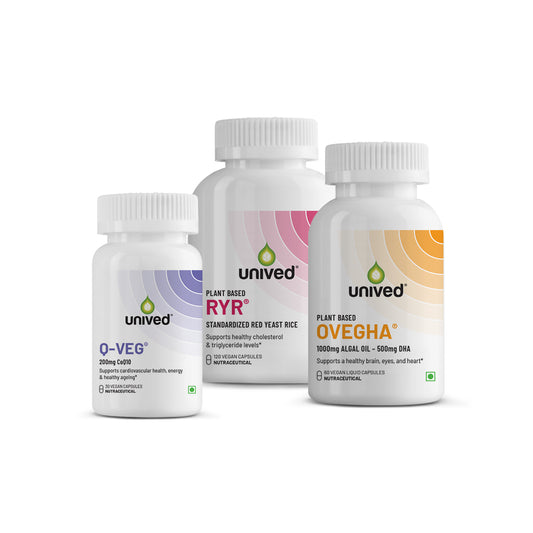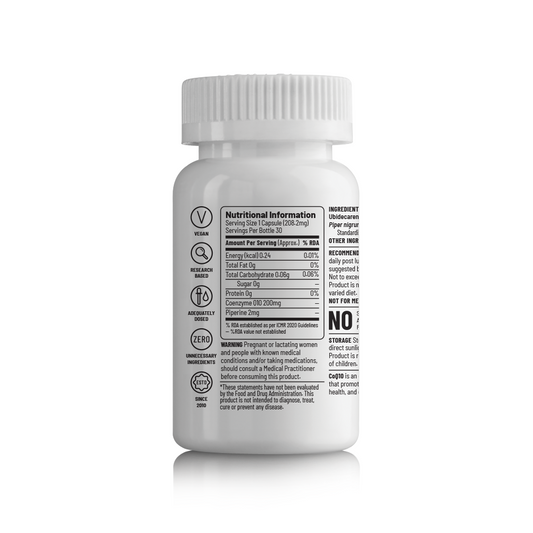Coenzyme Q10 is a compound that is involved in the making of
ATP, the major energy source of the body and drives numerous physiological
processes by transferring electrons and protons. CoQ10 is essential for the
health of nearly all human tissues and organs. It plays a crucial role in the
generation of cellular energy, and heart muscle contraction, and acts as a free
radical scavenger [9].
Coenzyme Q10 is present in higher concentration in heart
tissues. Although CoQ10 can be synthesized naturally by the body, there are
several instances when the body falls short of synthesizing enough to meet its
requirements. Aging, poor eating habits,
stress, and infection –all affect the organism’s ability to provide adequate
amounts of CoQ10. After about a certain age, we begin to lose the ability to
synthesize CoQ10 from food and its deficiency develops [9].
Many researchers suggest that using CoQ10 supplements alone
or in combination with other nutritional supplements may help maintain the
health of young adults, and elderly people and increase CoQ10 levels. Due to
these functions, CoQ10 is possibly ushering in a new era of
cellular/biochemical treatment, as a complementary approach for treating
several disorders, especially cardiovascular treatment.
Our Formulation
Unived’s Q-Veg is CoQ10, in its most natural and pure form.
It is formulated so that you may experience the maximum benefits of this
indispensable nutrient.
Mode of Action:
A. Antioxidant Functions:
- Coenzyme Q10 plays a major role in preventing oxidation in
both the lipids and protects the stability of the cell membrane and, protects
DNA from free radical-induced oxidative damage. [3], [10] - Coenzyme Q10 can also recycle or regenerate other
antioxidants such as vitamin E and vitamin C. [3], [10]
B. Cellular Energy Production:
- The oxidized form of CoQ10, ubiquinone, is required for
energy production in the mitochondria of all cells except the red blood cells.
Specifically, CoQ10 is required in several steps of the electron transport
chain in mitochondrial inner membranes, which is where cellular energy, known
as ATP, is produced (Fact: This is the work that earned Peter Mitchell his 1978
Nobel Prize) [3].
C. Cardiovascular Disease:
- Prevents LDL (bad cholesterol) peroxidation [4], [8], [12].
- Attenuates atherosclerotic lesions [4].
- Improves heart function [3].
- A 2-year treatment with CoQ10 (300 mg/day) as adjuvant
therapy in a randomized, controlled multicentre trial on 420 patients suffering
from heart failure demonstrated a reduction in major cardiovascular events
[11].
D. Physical/Exercise Performance:
- The key role of coenzyme Q10 in mitochondrial bioenergetics
has been suggested in its use in an attempt to improve aerobic capacity and
physical performance [4], [5]. - Increases plasma levels, reduces muscle cell oxidant damage,
and increases energy metabolism rebound for future exercise demand [6]. - Lowers serum oxidative stress after exercise and results in
increased exercise time to exhaustion [7]. - A study shows that oral administration of coenzyme Q10
improved subjective fatigue sensation and physical performance during
fatigue-inducing workload trials and might prevent unfavourable conditions as a
result of physical fatigue [1].
References:
1. Mizuno, Kei, et al. "Antifatigue effects of coenzyme
Q10 during physical fatigue." Nutrition 24.4 (2008): 293-299.
2. Aaseth, Jan, Jan Alexander, and Urban Alehagen.
"Coenzyme Q10 supplementation–In ageing and disease." Mechanisms of
Ageing and Development 197 (2021): 111521.
3. Pelton, Ross. "Coenzyme Q10: A Miracle Nutrient
Advances in Understanding." Integrative Medicine: A Clinician's Journal
19.2 (2020): 16.
4. Littarru, Gian Paolo, and Peter Lambrechts.
"Coenzyme Q 10: multiple benefits in one ingredient." Oléagineux,
Corps gras, Lipides 18.2 (2011): 76-82.
5. Gaby, Alan R. "The role of coenzyme Q10 in clinical
medicine: Part I." Alt Med Rev 1.1 (1996): 11-17.
6. Gökbel, Hakk, et al. "The effects of coenzyme Q10
supplementation on performance during repeated bouts of supramaximal exercise
in sedentary men." The Journal of Strength & Conditioning Research
24.1 (2010): 97-102.
7. Misner, Bill. "Ubiquinone Increases Performance of
an Elderly Runner: A Case Report." (2011).
8. (Yokoyama et al., 1996) in Kumar, Adarsh, et al.
"Role of coenzyme Q10 (CoQ10) in cardiac disease, hypertension and
Meniere-like syndrome." Pharmacology & therapeutics 124.3 (2009):
259-268.
9. Borekova, Martina, et al. "Nourishing and health
benefits of coenzyme Q10." Czech journal of food sciences 26.4 (2008):
229.
10. (Crane 2001) in
Borekova, Martina, et al. "Nourishing and health benefits of coenzyme
Q10." Czech journal of food sciences 26.4 (2008): 229.
11. (Mortensen et al., 2014) in Aaseth, Jan, Jan Alexander,
and Urban Alehagen. "Coenzyme Q10 supplementation–In ageing and
disease." Mechanisms of Ageing and Development 197 (2021): 111521.
12. (Watts et al., 2002) in Littarru, Gian Paolo, and Peter
Lambrechts. "Coenzyme Q 10: multiple benefits in one ingredient."
Oléagineux, Corps gras, Lipides 18.2 (2011): 76-82.
13. Jack Challem, ‘Coenzyme Q10 – Energy for Life’. The
Nutrition Reporter.





 SaleVendor:Lipid Health
SaleVendor:Lipid Health






